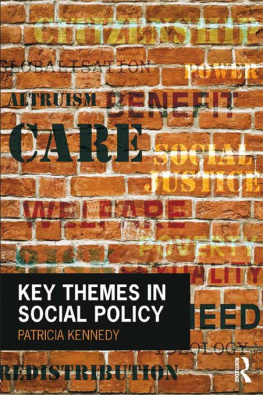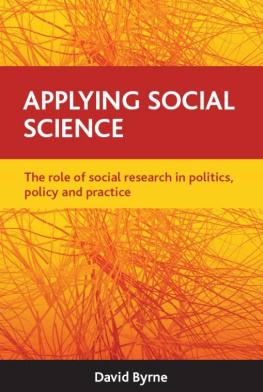Routledge Revivals
The Uses of Social Research
The growth and health of the social sciences owe a good deal to the generally held belief that they are socially useful, but is this really so? Do they deliver the goods they promise? In The Uses of Social Research, first published in 1982, Martin Bulmer answers these and other questions concerning the uses of empirical social science in the policy-making process, and provides an extended analysis of the main issues.
This title provides a valuable introduction to the patterns of influence exercised by the social sciences on government. It shows how the results of social research feed into the political system and what models of the relationship between research and policy are most convincing. This book will be of interest to students of the social sciences.
The Uses of Social Research
Social Investigation in Public Policy-Making
Martin Bulmer
First published in 1982
by George Allen & Unwin
This edition first published in 2015 by Routledge
2 Park Square, Milton Park, Abingdon, Oxon, OX14 4RN
and by Routledge
711 Third Avenue, New York, NY 10017
Routledge is an imprint of the Taylor & Francis Group, an informa business
1982 Martin Bulmer
The right of Martin Bulmer to be identified as author of this work has been asserted by him in accordance with sections 77 and 78 of the Copyright, Designs and Patents Act 1988.
All rights reserved. No part of this book may be reprinted or reproduced or utilised in any form or by any electronic, mechanical, or other means, now known or hereafter invented, including photocopying and recording, or in any information storage or retrieval system, without permission in writing from the publishers.
Publishers Note
The publisher has gone to great lengths to ensure the quality of this reprint but points out that some imperfections in the original copies may be apparent.
Disclaimer
The publisher has made every effort to trace copyright holders and welcomes correspondence from those they have been unable to contact.
A Library of Congress record exists under LC control number: 81020580
ISBN 13: 978-1-138-90233-6 (hbk)
ISBN 13: 978-1-315-69745-1 (ebk)
The Uses of
Social Research
Social Investigation in Public
Policy-Making
MARTIN BULMER
Martin Bulmer, 1982
This book is copyright under the Berne Convention. No reproduction without permission. All rights reserved.
George Allen & Unwin (Publishers) Ltd,
40 Museum Street, London WC1A 1LU, UK
George Allen & Unwin (Publishers) Ltd,
Park Lane, Hemel Hempstead, Herts HP2 4TE, UK
Allen & Unwin, Inc.,
9 Winchester Terrace, Winchester, Mass. 01890, USA
George Allen & Unwin Australia Pty Ltd,
8 Napier Street, North Sydney, NSW 2060, Australia
First published in 1982
Second impression 1983
British Library Cataloguing in Publication Data
Bulmer, Martin
The uses of social research: social investigation in public policy-making.
1. Decision making 2. Great Britain
Social policy
I. Title
361.610941 HN390
ISBN 0-04-312011-3
ISBN 0-04-312012-1 Pbk
Library of Congress Cataloging in Publication Data
Bulmer, Martin.
The uses of social research.
(Contemporary social research series; 3)
Bibliography: p.
Includes index.
1. Policy sciences Research. 2. Social Sciences Research.
I. Title. II. Series.
H97.B84 361.61072 81-20580
ISBN 0-04-312011-3 AACR2
ISBN 0-04-312012-1 (pbk.)
Set in 10 on 11 point Times by Rowland Phototypesetting Ltd, Bury St Edmunds, Suffolk
and printed in Great Britain by Billings and Sons Ltd, Guildford, London and Worcester
Contents
To Joan
Preface
This book appears as part of the Contemporary Social Research series, which I edit. The series is concerned with topics in the methodology of social research, with the principles and practice whereby the structure of the social sciences is kept standing. This structure combines two separate elements, theory and empirical evidence. That one without the other is barren and that both are necessary for successful social understanding is one of the central themes of this book, as of the series as a whole.
The series is intended to provide concise introductions to significant methodological topics. Broadly conceived, research methodology deals with the general grounds for the validity of social scientific propositions. How do we know what we do know about the social world? More narrowly, it deals with the questions: how do we actually acquire new knowledge about the world in which we live? What are the strategies and techniques by means of which social science data are collected and analysed? The series will seek to answer such questions through the examination of specific areas of methodology. Titles in the series focus upon specific topics, procedures, methods of analysis and methodological problems to provide a readable introduction to its subject. The intended audience includes the advanced undergraduate, the graduate student, the working social researcher seeking to familiarise himself with new areas, and the non-specialist who wishes to enlarge his knowledge of social research. Research methodology need not be remote and inaccessible. The series is concerned above all to demonstrate the general importance and centrality of research methodology to social science.
The Uses of Social Research deals with the ways in which empirical social research gets used in the policy-making process. There has been a growing interest in the potential usefulness of social science, particularly during the last twenty years, though the roots of this interest are much older. The growth and relative health of the social sciences owes a good deal to the belief that they offer useful knowledge to policymakers, who are therefore willing to finance both teaching and research on a large scale. What, however, does one mean by research, since it is not a unitary term and may mean different things to different people? What is meant by use and utilisation? What models of the relationship between research and policy are most convincing?
Questions of this kind have interested me ever since I spent a short period working in the British civil service in the mid-1970s. The gulf which tends to separate the British academic social scientist (particularly in sociology, political science and psychology) from the world of the politician and administrator is a broad one which needs to be bridged more often than it is at present. Social research inside government tends to be identified with descriptive studies and information-gathering, uninformed by any type of social science theory. A good deal of social science theory on the other hand, particularly in sociology, shows little familiarity with the empirical world, while subjects like social administration which study the policy process are still to a considerable extent wedded to outmoded empiricist conceptions of the nature of social scientific knowledge. One purpose of this book is to criticise such empiricist views of knowledge as failing to gain a proper purchase upon the nature of social phenomena. This discussion draws on examples such as deprivation, handicap and health from the social policy field.









